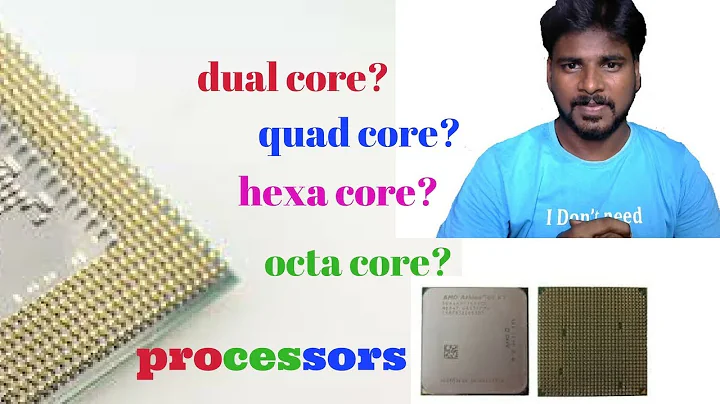What is the meaning of dual core vs. dual cpus?
Solution 1
Multiple CPU processors (like the Pentium D) are literally just two distinct CPUs (two dies) that just happen to share the same physical package.
So, instead of having 2 CPUs in 2 sockets, you have 2 CPUs that just happen to fit in one socket together. Basically, there's no difference between having, say, 2 physical early-generation Xenon CPUs (each in their own socket) and a single Pentium D. (Note: This is very much a simplification.)
Multi-core CPU processors (like the the Core 2 series) are two processing units that share the same die (silicon substrate).
So, the multiple CPU processors are like having 2 CPUs which are just conveniently packaged together, whereas the multi-core CPU processors are 2 CPUs on the same chip.
If this seems like a subtle distinction, that's because it is.
Of course, there's more to it than that - for one thing, having the two CPUs on the same die is more efficient (both power-consumption-wise as well as instruction-wise, due to a different internal design). Additionally, having the CPU cores on the same die means they can share things like L1 cache, whereas when the two CPUs are physically separate dies, they each have to have their own cache.
It gets even more complicated when you throw quad-core chips into the mix, because they are 2 dual-core chips which just happen to share the same physical packaging... kind of like the Pentium D. But that's a digression for another day.
Solution 2
The difference is really all down to busses.
A dual-core CPU is like having two CPUs inside one chip. But, they both have to access the motherboard resources through the one set of pins. Granted, the number of pins is pretty huge these days compared with the older CPUs.
Having two (or more) separate CPUs has the advantage that each CPU has direct access to the motherboard resources through its own set of pins.
While not a massive difference in speed, for memory or IO intensive operations (not CPU bound) the dual CPU model is marginally faster.
Related videos on Youtube
sumeyye
Updated on September 17, 2022Comments
-
sumeyye over 1 year
What is the difference between multiple CPU processors (ie: Pentium D) and multicore processors (ie: Core 2 duo)?
-
sumeyye about 13 yearsmy question is very easy, not about new technology. What is the innovation with pentium family? I heard that pentium family has two cpu, is that true? and what's different between two cpu and dual core ? thanks..
-
 Ƭᴇcʜιᴇ007 about 13 years@sumeyye: Your question was VERY unclear. Matt's answer is about as close to an answer as was possible (multiple CPUs vs. multicore CPUs). There are no more Pentiums, and what you're saying about them is false (in a general way), check out Intel Pentium on Wikipedia.
Ƭᴇcʜιᴇ007 about 13 years@sumeyye: Your question was VERY unclear. Matt's answer is about as close to an answer as was possible (multiple CPUs vs. multicore CPUs). There are no more Pentiums, and what you're saying about them is false (in a general way), check out Intel Pentium on Wikipedia. -
 MDMarra about 13 yearsAll Pentium Ds are dual core.
MDMarra about 13 yearsAll Pentium Ds are dual core. -
Florenz Kley about 13 yearsMatt: that's only half the truth... there are resources on the die that every core has access to without having to go over a bus, like the CPU cache.
-
Florenz Kley about 13 yearssumeye: if a question is easy or not is something you only can answer if you know the answer, right? Matt did a good job, answering a very broad question in a sensible way. Your questions mixes up three in one - Pentium vs. Core architecture, single-cpu vs. multi-cpu, single-core vs. multi-core. Not easy to divine what you want to know.
-
FJ de Brienne about 13 years@FlorenzKley I have highlighted the bit that states not CPU bound i.e., things outside the die.
-
Pacerier almost 8 years@Keithius, So... does this mean that multiple CPU processor is superior to multi-core single CPU processor?
-
Pacerier almost 8 years@Majenko, So.. are there any situations where multi-core single CPU processor can be superior to multiple CPU processor? Or is multiple CPU processor always superior regardless?
-
FJ de Brienne almost 8 years@Pacerier Multi-core uses less space (you probably have a multi-core processor in your smartphone) and less power. They are also cheaper since they use less physical resources (gold, etc).
-
Pacerier almost 8 years@Majenko, Regarding performance though (as opposed to cost) why do benchmarks consistently show multi-core beats multi-processor? E.g. in this AMD benchmark, dual-core consistently beats dual-processor. The following Intel benchmark also has most results having dual-core as the winner, with the conclusion "So while the processors may be very comparable in performance the overall win definitely goes to the Pentium D dual-core platform". How does this match-up with the analysis above?
-
FJ de Brienne almost 8 yearsThe comparisons aren't valid for looking purely at the CPU. As it states on that site the memory bandwidth is different between the two systems. That has a big impact on the results. It is also nothing to do with dual-core / dual-cpu - as they say "intel haven't updated the xeon for faster memory yet".




